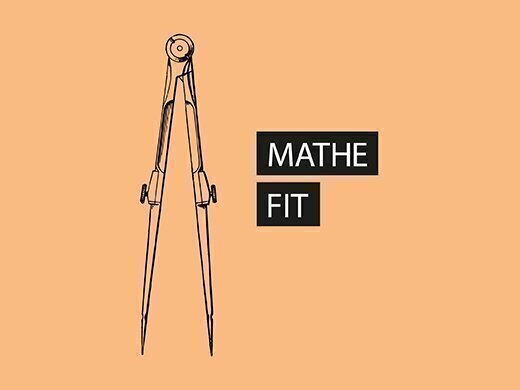Mathe-Fit (2025/26)
Kursstart: 1. August 2025
Mathe-Fit (2025/26)
Philipp Sprüssel
Dieser Kurs ist Teil einer MOOC-Serie: Fit fürs Studium
Wissenschaftliche Einordnung:
Kursstart: 1. August 2025
Mathe-Fit (2025/26)
Philipp Sprüssel
Dieser Kurs ist Teil einer MOOC-Serie: Fit fürs Studium
-
Umfang: 7 Lektionen
-
Aufwand: 2 Stunden/Woche
-
Teilnehmende aktuell: 951
-
Lizenz: CC BY 4.0
-
Kursstart: 1. August 2025
-
Kursende: 31. Mai 2026
-
Status aktuell: Laufender Kurs
-
Verfügbare Sprachen:
Details zum Kurs
Allgemeine Informationen zum Kurs
Kursinhalt
- Modul 1: Mengen und Zahlen
- Modul 2: Logik
- Modul 3: Brüche
- Modul 4: Lineare und quadratische Gleichungen
inklusive Betrags- und Ungleichungen - Modul 5: Funktionen
- Modul 6: Vektoren im Raum
- Modul 7: Differentialrechnung *
* Details zu Modul 7 lesen Sie bitte weiter unten bei "ECTS-Anrechnungspunkte"
Lernziele
Der iMooX-Kurs Mathe-Fit dient als verbindlicher Vorbereitungskurs für die gleichnamige TU Graz Lehrveranstaltung. Beides zusammen, Online-Kurs und Lehrveranstaltung, sind speziell ein Angebot für Erstsemestrige der TU Graz, die eigenen Fähigkeiten und Fertigkeiten im Fach Mathematik zu überprüfen und aufzufrischen, damit der Übergang und Start ins Studium möglichst reibungslos verläuft. Gemeinsam mit dem Mathe-Kompass-Kurs bilden sie ein umfassendes mathematisches Starterpaket, welches nicht nur für angehende Studierende der TU Graz geeignet ist, sondern sich generell an all jene richtet, die an mathematischen Inhalten interessiert sind.
Vorkenntnisse
Grundsätzlich Kenntnisse des Oberstufen-Lehrinhalts im Fach Mathematik.
Kursablauf
Zertifikat
Für die aktive Teilnahme am Kurs erfolgt bei Abschluss die Ausstellung einer automatisierten Teilnahmebestätigung, welche Ihren Benutzernamen, den Kursnamen, die Kursdauer und den Aufwand beinhalten. Es wird darauf hingewiesen, dass es sich nur um eine Bestätigung handelt, die aussagt, dass die Benutzerin oder der Benutzer zumindest 75% der gestellten Selbstüberprüfungsfragen richtig beantwortet hat.
Lizenz
Zusätzliche Inhalte
ECTS-Anrechnungspunkte
HINWEIS: Der MOOC ist natürlich öffentlich und frei zugänglich.
Dieser MOOC wird für Studienanfänger*innen des Wintersemesters auch als Teil der Lehrveranstaltung "Mathe-Fit" an der Technischen Universität Graz (TU Graz) angeboten. Um an der Lehrveranstaltung teilnehmen zu können, ist es notwendig, dass Sie an der TU Graz gemeldet sind und sich dort zu dieser Lehrveranstaltung anmelden. Sind Sie an der TU Graz angemeldet, benötigen Sie keine zusätzliche Registrierung auf dieser MOOC-Plattform, sondern können sich mit Ihren TU Graz Anmeldedaten einloggen (Anmeldung mit eduID).
Als Voraussetzung für den positiven Abschluss der Vorlesung ist es nötig, dass Sie zuerst in diesem MOOC die Selbstüberprüfungsfragen der Module 1 bis 6 mit je 75% Erfolg durchgeführt haben. Das Modul 7 (Differentialrechnung) ist für die Lehrveranstaltung nicht verpflichtend zu machen, sondern kann (muss aber nicht) zusätzlich freiwillig absolviert werden. Die eigentliche (elektronische) Prüfung zur Lehrveranstaltung findet an der TU Graz Anfang Oktober statt. Bei positivem Abschluss der Lehrveranstaltung erhalten Sie das Zeugnis mit den entsprechenden ECTS .
Weitere Angaben entnehmen Sie bitte der Lehrveranstaltungsbeschreibung (folgt) bzw. Ihrem Curriculum selbst.
Kursleitung
Philipp Sprüssel
Philipp Sprüssel hat an der Universität Hamburg Mathematik studiert und dort 2010 promoviert. Bevor er 2012 als Universitätsassistent nach Graz kam, war er jeweils ein Jahr in Oxford und in Haifa (Israel) tätig. Seit 2019 arbeitet er an der TU Graz als Senior Lecturer und ist an der Durchführung zahlreicher Lehrveranstaltungen beteiligt. Seine Forschungsgebiete sind probabilistische, enumerative und analytische Kombinatorik.
An diesem MOOC haben ebenso mitgearbeitet:
- Franz Lehner
- Christoph Aisleitner
Franz Lehner hat Technische Mathematik an der Johannes-Kepler-Universität Linz studiert und an der Universite Pierre et Marie Curie (Paris 6) promoviert. Er ist nach mehrjährigen Auslandsaufenthalten seit 2001 an der TU Graz beschäftigt und seit 2011 Associate Professor. Seine wissenschaftlichen Interessen umfassen Spektraltheorie und nichtkommutative Wahrscheinlichkeitstheorie im Grenzgebiet zwischen Funktionalanalysis und Kombinatorik.
Partner:innen
-

Technische Universität Graz

